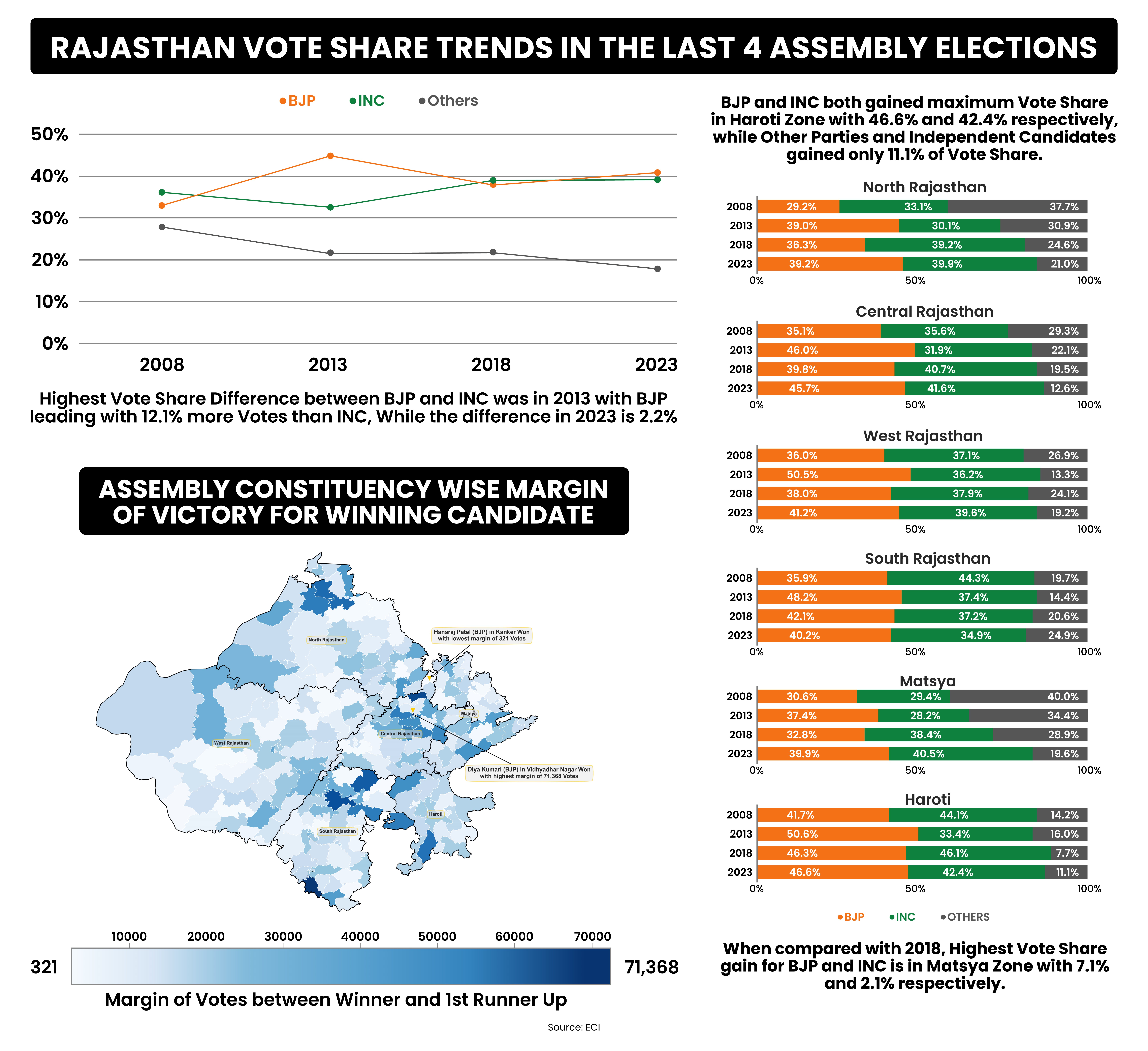
In the recent elections in Rajasthan, a state known for its historical oscillation between political parties, the Bharatiya Janata Party (BJP) has emerged victorious by ousting the incumbent Indian National Congress government by securing an impressive 115 seats. The Indian National Congress, in contrast, managed to secure 69 seats. What adds an intriguing dimension to this electoral outcome is the minimal 2% difference in vote share between the two major parties. Despite the narrow gap in vote share, the average winning margin was 19.29%.
| Party | Seat Count | Vote Share |
|---|---|---|
| BJP | 115 | 41.7% |
| INC | 69 | 39.5% |
| Others | 15 | 18.8% |
Source of Table: ECI
The state recorded a 75.45% voter turnout with female voter turnout surpassing the male voter turnout.
| Gender | Voter Turnout% |
|---|---|
| Male | 74.53 |
| Female | 74.72 |
| Overall | 75.45 |
Source of Table: ECI
In North Rajasthan and the Haroti region, the Congress saw a minimal loss of just one seat, while other regions experienced more substantial setbacks. The West Rajasthan region, in particular, witnessed a notable electoral sweep, with the BJP clinching 13 seats. Conversely, in Central Rajasthan, smaller parties failed to make an impact, losing all 5 seats, as the BJP surged to secure 25 seats—a significant leap from their 2018 assembly election tally of 12 seats.
| 2023 AE | 2018 AE | |||||
| Zone | BJP | INC | Others | BJP | INC | Others |
| Central Rajasthan | 25 | 11 | 0 | 12 | 19 | 5 |
| Haroti | 11 | 6 | 0 | 10 | 7 | 0 |
| Matsya | 14 | 13 | 3 | 4 | 17 | 9 |
| North Rajasthan | 15 | 21 | 2 | 12 | 22 | 5 |
| South Rajasthan | 22 | 8 | 5 | 20 | 12 | 3 |
| West Rajasthan | 28 | 10 | 5 | 15 | 23 | 5 |
Source: ECI
Key personalities such as Vasundhara Raje, Sachin Pilot and Ashok Gehlot won in their respective constituencies. Bhajan Lal Sharma won in Sanganer with a 19.4% margin and has made history as the BJP's first Brahmin Chief Minister in the state since 1990.
The smaller parties won the same amount of seats in both rural and urban areas as won in the 2018 assembly elections. The smaller parties maintained a consistent seat count in both rural and urban areas, mirroring their performance in the 2018 assembly elections.
| 2023 AE | 2018 AE | |||||
| Party | BJP | INC | Others | BJP | INC | Others |
| Rural | 93 | 65 | 13 | 59 | 88 | 13 |
| Urban | 22 | 4 | 2 | 14 | 12 | 2 |
Source: ECI
Intriguingly, the Congress gained two seats in the ST- dominated seats whereas the party faced setbacks in other seat categories losing 7 seats in SC-dominated areas.
| 2023 AE | 2018 AE | |||||
| Seat Category | BJP | INC | Others | BJP | INC | Others |
| GEN | 87 | 51 | 8 | 53 | 77 | 17 |
| SC | 19 | 10 | 4 | 12 | 17 | 4 |
| ST | 9 | 8 | 3 | 8 | 6 | 6 |
Source: ECI
The BJP’s victory came as a setback to Chief Minister Ashok Gehlot, who was expecting to The BJP's triumph in the recent elections is a setback to Chief Minister Ashok Gehlot, who had anticipated overcoming anti-incumbency through his welfare initiatives, social security measures, and a roster of seven guarantees for the electorate. Despite Gehlot's efforts, the resonance of the Prime Minister's campaign and rallies with voters proved more impactful. As emerging figures such as Bhajan Lal Sharma come into focus, the pivotal question lingers: Can he carve out a lasting influence and establish a formidable presence in the state's political landscape? This electoral scenario serves as a preview of future political strategies, shedding light on what might prove effective and what challenges lie ahead in upcoming elections.

Dhruv Research owned by DHRUVA RESEARCH
Copyright © 2021
DHRUVA RESEARCH.
All rights reserved.